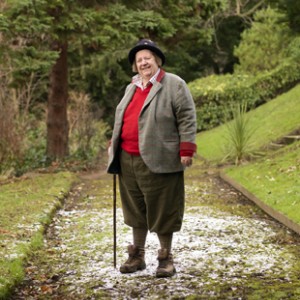Clarissa Dickson Wright talks to Fergus Byrne
According to Clarissa Dickson Wright, the trouble with cooking and cookery books in this country is the chefs. “People either do things which are totally banal or over complicate things,” she says. “Chefs are rather like lawyers, I mean they complicate things for the sake of complicating – to make themselves appear rather more important than they really are.” As someone who passed her bar exams aged 21, becoming the country’s youngest female barrister, she should know. She is currently ensconced in London’s Goring Hotel talking about her new book Potty: Clarissa’s One Pot Cookbook. I suggest that the title is very her, to which she readily agrees but points out that it is also dedicated to her two and a half-year-old goddaughter and therefore doubly relevant.
After her last two books: Spilling the Beans, a very detailed account of her extraordinary life and, Rifling Through My Drawers, an account of a journey around Britain with yet more stories and anecdotes from her life, Potty, is simply a cookbook. It contains over 100 of her favourite recipes. The hook, for those that aren’t already fans of Clarissa’s no-nonsense style, is that all the recipes in the book can be made in one pot. Its simplicity is what elicits the comments that chefs are the root of the problem with cookery. In Michael Ball’s current TV show Clarissa is cooking from the book and teaching Michael how simple cooking can be. “He’s going ‘it’s so easy’ and I’m going ‘well that’s what cooking should be, really’”.
Clarissa speaks well of Marco Pierre White and Shawn Hill and although perhaps not over enamoured with this country’s chefs in general, she is nonetheless a fan of British food. “It’s excellent!” she says. “In 1748 you had the Venetian ambassador writing about how good English food is and you don’t get much more hedonistic than Venice really, do you?” The ambassador is quoted as saying at the time, ‘The food of the inns of England is the stuff of which Heaven is made’. She remembers how during filming of her very successful TV show, Two Fat Ladies, she and the late Jennifer Paterson went to visit Jamie Oliver’s pub before he became a national name. Having heard that Jennifer loved suckling pig he had gone out and found one and cooked them a magnificent meal. Although she reiterates her disappointment with Jamie for “wasting his opportunity to become a force for good”, she believes he is a good cook and she also has a lot of time for Hugh Fearnley-Whittingstall, though suggests that “the thing with Tesco and the chickens was at best naïve”.
Anyone who has read her autobiography will know her life has been a roller coaster. Brought up in a well to do family with servants and all the trappings of a privileged background, she was nonetheless beaten horribly by an abusive alcoholic father who had been chief surgeon to the royal family. She remembers boarding school and her mother as two refuges from his violent temper. To spite her father, who hated lawyers, she decided to choose that profession and became the youngest woman to be called to the bar. Years later on hearing of her mother’s death, she turned to alcohol and herself became an alcoholic, quickly frittering away her massive inheritance on a lavish lifestyle. She attended a recovery clinic at the end of the eighties and for a time carved a hugely successful career in television. She made three series of Two Fat Ladies with Jennifer Paterson, who died in 1999 while filming the fourth series. It was the kind of scenario that could so easily have plunged her back into alcoholism but instead, she has wonderful memories that she uses to brighten the bad days. For example when the series was dubbed into Japanese the company used a male voiceover for her part. “To make myself laugh when things seem really black” she tells me. “I just go and put on the video of Jennifer and I in Japanese. It is so ridiculous.”
Clarissa Dickson Wright is not one to pull her punches in any situation and over the years her political opinions and support for the Countryside Alliance have put her in the firing line. She was beset with numerous death threats for her stance on hunting and received an absolute discharge when she when taken to court accused of hare coursing in 2009. However, she believes the recent change of government must be good for the country. “I think there are a lot of good people,” she says, referring to the current crop of politicians. “The overall whole seems to be so much better from the countryside point of view and from the British food point of view – and the British farmer’s point of view.” She was never a fan of the Labour party, knowing Tony Blair as ‘Miranda’ during her days at the bar and was not a fan of Jack Straw’s ‘passionate communism’, however, the new government may also change her career. She is currently doing a one-off television programme called The Great British Food Revival and has a few other things in the pipeline. She laughs saying, “I always said when there was a change of government I would get back on the television, and it looks like I was right.”
Though there is a smattering of British classics in Potty, the book carries recipes with a wide range of influences from all around the world. Omelette Stephanie, for example, is credited to Crown Princess Stephanie, the wife of the Austrian Crown Prince Rudolph. Clarissa points out that there have been plays, films, novels and even a ballet written on the theme of the Crown Prince and his role in starting the First World War, but his wife’s recipe for an omelette with raspberries is little known – shocking. Mexican Corn Pudding, Romanian Pork and Puerto Rican Rice sit happily alongside Steak and Kidney Pie and Stuffed Vegetable Marrow and they are complemented by a new twist on the great British breakfast – Bacon and Eggs in a Mug. Potty will be fantastically useful for those dull British winter days when energy levels are low and simplicity is needed to produce a good meal. Clarissa’s wealth of recipe knowledge, combined with a touch of ingenuity in the kitchen, has produced a cookbook that could so easily become more than well-thumbed.










